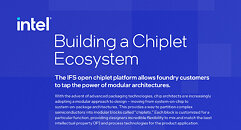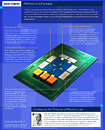- Joined
- Oct 9, 2007
- Messages
- 47,593 (7.45/day)
- Location
- Dublin, Ireland
| System Name | RBMK-1000 |
|---|---|
| Processor | AMD Ryzen 7 5700G |
| Motherboard | Gigabyte B550 AORUS Elite V2 |
| Cooling | DeepCool Gammax L240 V2 |
| Memory | 2x 16GB DDR4-3200 |
| Video Card(s) | Galax RTX 4070 Ti EX |
| Storage | Samsung 990 1TB |
| Display(s) | BenQ 1440p 60 Hz 27-inch |
| Case | Corsair Carbide 100R |
| Audio Device(s) | ASUS SupremeFX S1220A |
| Power Supply | Cooler Master MWE Gold 650W |
| Mouse | ASUS ROG Strix Impact |
| Keyboard | Gamdias Hermes E2 |
| Software | Windows 11 Pro |
Intel, along with Advanced Semiconductor Engineering Inc. (ASE), AMD, Arm, Google Cloud, Meta, Microsoft Corp., Qualcomm Inc., Samsung and Taiwan Semiconductor Manufacturing Co., have announced the establishment of an industry consortium to promote an open die-to-die interconnect standard called Universal Chiplet Interconnect Express (UCIe). Building on its work on the open Advanced Interface Bus (AIB), Intel developed the UCIe standard and donated it to the group of founding members as an open specification that defines the interconnect between chiplets within a package, enabling an open chiplet ecosystem and ubiquitous interconnect at the package level.
"Integrating multiple chiplets in a package to deliver product innovation across market segments is the future of the semiconductor industry and a pillar of Intel's IDM 2.0 strategy," said Sandra Rivera, executive vice president and general manager of the Datacenter and Artificial Intelligence Group at Intel. "Critical to this future is an open chiplet ecosystem with key industry partners working together under the UCIe Consortium toward a common goal of transforming the way the industry delivers new products and continues to deliver on the promise of Moore's Law."



The founding companies, representing a wide range of industry expertise across cloud service providers, foundries, system OEMs, silicon IP providers and chip designers, are finalizing incorporation as an open standards body. Upon incorporation of the new UCIe industry organization this year, member companies will begin work on the next generation of UCIe technology, including defining the chiplet form factor, management, enhanced security and other essential protocols.
The chiplet ecosystem created by UCIe is a critical step in the creation of unified standards for interoperable chiplets, which will ultimately allow for the next generation of technological innovations.
For more information, visit this page.
View at TechPowerUp Main Site
"Integrating multiple chiplets in a package to deliver product innovation across market segments is the future of the semiconductor industry and a pillar of Intel's IDM 2.0 strategy," said Sandra Rivera, executive vice president and general manager of the Datacenter and Artificial Intelligence Group at Intel. "Critical to this future is an open chiplet ecosystem with key industry partners working together under the UCIe Consortium toward a common goal of transforming the way the industry delivers new products and continues to deliver on the promise of Moore's Law."



The founding companies, representing a wide range of industry expertise across cloud service providers, foundries, system OEMs, silicon IP providers and chip designers, are finalizing incorporation as an open standards body. Upon incorporation of the new UCIe industry organization this year, member companies will begin work on the next generation of UCIe technology, including defining the chiplet form factor, management, enhanced security and other essential protocols.
The chiplet ecosystem created by UCIe is a critical step in the creation of unified standards for interoperable chiplets, which will ultimately allow for the next generation of technological innovations.
For more information, visit this page.
View at TechPowerUp Main Site





